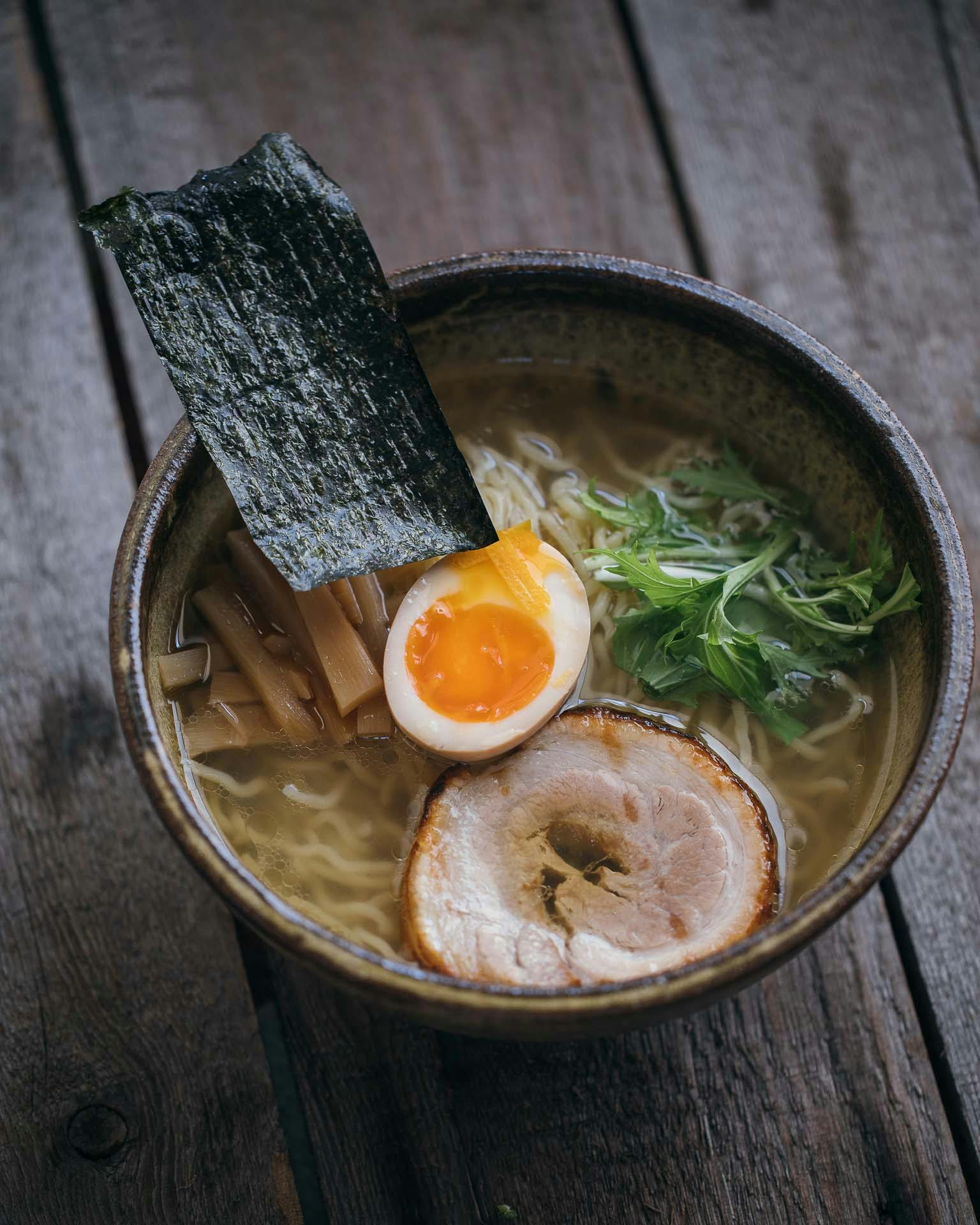Ramen School 004: Afuri-style Yuzu Shio Ramen
Ramen School

Afuri is one of Tokyo's most famous ramen restaurants. Their signature ramen is the a Yuzu Shio style of ramen (yuzu is a type of Japanese citrus, and 'shio' is the Japanese term for salt. This isn't intended to be a copycat recipe, but I think it's useful to have a guide to work toward when experimenting with ramen, to see how the process of making each of the elements of ramen can lead you toward a specific result.
In this recipe we will use a lot of the different ramen elements that we have made in previous episodes - namely the Basic Chintan broth, rolled Chashu and Ramen eggs.
Below are the additional elements we'll need to make the tare (sauce) and the aromatic oil.
Ingredients
- 1 quantity Basic Chintan broth
- 1 piece rolled pork belly Chashu
- fresh ramen noodles (around 180g per person)
- menma
- nori, cut into 10 cm x 5 cm pieces
- 2-day cured ajitama (ramen eggs), halved
- 1 quantity Basic Chintan broth
- 1 piece rolled pork belly Chashu
- fresh ramen noodles (around 180g per person)
- menma
- nori, cut into 10 cm x 5 cm pieces
- 2-day cured ajitama (ramen eggs), halved
- Shio Tare
- 60 ml sake
- 100 ml mirin
- 20 g sugar
- 75 g salt
- 250 ml Basic Chintan broth
- 10 ml rice vinegar
- juice of 1 yuzu (optional)
- Aromatic Oil
- 50 ml rendered chicken fat, chopped
- 150 g solid pork fat, chopped
- 75 ml canola oil
- 5 spring onions, cut into 2cm pieces
- rind from ½ yuzu
- 60 ml sake
- 100 ml mirin
- 20 g sugar
- 75 g salt
- 250 ml Basic Chintan broth
- 10 ml rice vinegar
- juice of 1 yuzu (optional)
- Aromatic Oil
- 50 ml rendered chicken fat, chopped
- 150 g solid pork fat, chopped
- 75 ml canola oil
- 5 spring onions, cut into 2cm pieces
- rind from ½ yuzu
Method
- For the Shio Tare, combine the ingredients except the rice vinegar in a saucepan and bring to a simmer. Simmer for 15 minutes, allow to cool. Then strain and add the vinegar and yuzu juice (if using).
- For the Aromatic Oil combine all the ingredients except the yuzu in a saucepan and bring to a simmer over low-medium heat. Simmer for about 25 minutes until the oil is rendered and the spring onions are starting to brown. Remove from the heat, strain and pour over the et aside.
- To assemble the ramen, bring the broth to a simmer. In a separate pot, bring ample water to the boil for cooking the noodles. Take a slice of chashu around ½ cm thick and grill it until hot and the fat is bubbling.
- Add the noodles to a noodle strainer and plunge into the boiling water. Stir vigorously with chopsticks for about 10 seconds to separate the noodles. Cook for 3 minutes or until the noodles are cooked to your preferred texture, then remove them from the water, shaking to remove any water trapped between the noodles.
- Heat your noodle bowl by filling it with hot broth, then pour the broth back into the heating pot. Add 480ml of Chintan broth to the bowl then add 40ml of the Shio Tare and 30 ml of the Aromatic Oil (you can vary the proportions here to taste, but the broth should be quite salty before the noodles are added).
- Add the noodles to the broth, lifting them up with chopsticks and laying them back down into the soup. Top with the menma, egg,
Tips
- If you can't find yuzu, just leave it out. While it is similar to lemon in its aroma, it is not necessary for this dish. Focus instead on getting a good balance of seasoning into the broth and tare.
- Good quality ramen noodles are best freshly made, but if you don't have any producers of fresh noodles in your area, you can get excellent results with frozen noodles. (Or stay tuned to my YouTube channel where I will be showing you how to make noodles from scratch.)
- Menma, nori and mizuna can be found at Japanese grocers.

